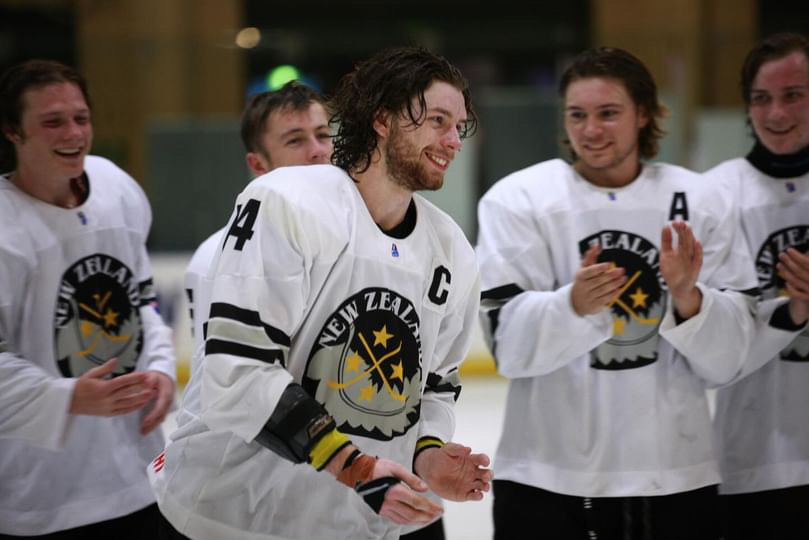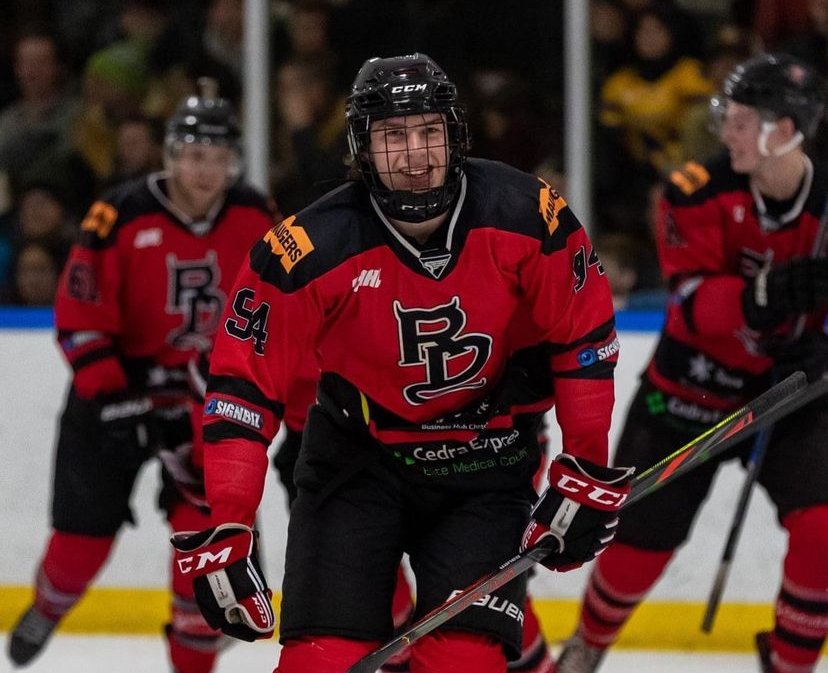
Jacob Carey is an 18-year-old forward for the New Jersey Rockets (USPHL Premier) and CBR Brave (AIHL). Being born in Christchurch, Carey has represented New Zealand at the 2024 World Championship, two World Juniors in 2023 and 2024, and also captained his nation to gold at the 2023 U18 World Championship D3B.
Interview
Q: Being from New Zealand, how did you get involved in ice hockey?
A: My brother was the first in the family to start hockey. I think it was the 2011 Winter Classic that my brother was watching on TV, still the only hockey game I’ve ever seen aired on NZ TV to this day, that sparked his interest in the sport. I thought nothing of it at the time and walked straight past it to go play on the Xbox, but after that my parents took my brother to the rink for the learn-to-play program. The Canterbury Red Devils goalie was there helping out and he had a cool custom mask so my brother became a goalie because he liked the mask and a couple years later I became a player because I wanted to score on him. Now my dad has got involved in managing the U20 national team and has a big role in the national youth development program. My mom was also a big hockey mom.
Q: Who would you say is your biggest inspiration when it comes to hockey?
A: Well my brother is the reason I started so I have to thank him for that. Once I got into the game at around 7-8 years old, my coaches Dean Tonks and Chris Eaden, who both were top players in the NZIHL, really sparked my love for the game. They were incredible to watch and years later to play with. Once I realized the NZIHL wasn’t on NHL 14 I realized the NHL was the best league in the world and I’d go watch random highlight reels on YouTube and then go try the moves and shots I saw in my backyard/garage. That’s when Datsyuk became my favourite player. But in March 2017, Johnny Gaudreau scored a sick coast-to-coast wraparound goal against Pittsburgh which really made me fall in love with the game and inspired me to start working harder so I could pull off plays like that. Nowadays I draw inspiration from pretty much everyone. I love studying players and figuring out what makes them good and how they do it and try to learn bits and pieces from everyone to benefit my game. Players like Hyman and Tanev I’ll always look up to as they weren’t necessarily highly regarded prospects, but took the long road to achieve their goals.

Q: You spent this season playing in the USPHL Premier and now the AIHL. How would you compare those leagues?
A: The AIHL is definitely for the most part better. Obviously, the Premier isn’t the highest junior league available but there are certainly a lot of talented players playing there. Because there are so many teams, you’re going to have a lot of teams varying in talent. The top teams are pretty darn good. CJR for example, who we got to battle it out with a few times throughout the year, won it all and skated circles around a lot of the competition. Also, it’s juniors so players are still finding their way as hockey players. The AIHL on the other hand, is a men’s league so most of the players have already been through juniors. There is still a bit of disparity in talent between the best local players and the rest, just as is in the USPHL. However, the top talent in the AIHL is incredible. I’m very fortunate in Canberra to be surrounded by some of the best local players in Australia and NZ and some of the best imports in the league. For example, on my team alone, we have the Kubara brothers who have all had success at pretty high levels overseas and are staples in the national team and league, especially Casey. Cangelosi, one of our imports, also had a very successful tenure at Boston College from 2013/14 to 2016/17 and has experience in the AHL and DEL. There are also a couple players with NHL experience in Melbourne. Needless to say, there is no shortage of talent around the league with every team having at least a few players with high-level junior, college, or professional experience.
Q: What are your goals as a player?
A: My dream is for hockey to become mainstream in NZ so people don’t need to leave their homes like I did at 13 to achieve their goals. To fuel that ambition is a series of goals to help it become a reality. Starting generic, I want to look back on my career knowing I did everything I possibly could’ve done to become the best hockey player and person possible. Getting into specifics, much like most young aspiring hockey players, I want to lift the Stanley Cup. Nathan Walker from Australia did it, so I believe someone from NZ needs to do it. Of course, I have a lot of smaller, day-to-day, and season-to-season goals but they’re all in place as stepping stones to help achieve the big ones in the future. If anyone reading this can help in any way, big or small, that would be greatly appreciated!

Q: You were apart of a New Zealand team that had their best finish at the World Juniors since 2015. What must be done to ensure consistent results from year-to-year?
A: I think we just have to keep the train on the tracks. NZ hockey is getting better and better, much thanks to the youth development program and camps. Being part of that team was special, unfortunately, I got concussed during the second game so I only got to play a few periods, but it truly was a brotherhood in there. No egos, all in, and determined to achieve the same goal, to win. Next year I’m convinced gold is ours for the taking. My experience was much the same with the Ice Blacks. Unfortunately, we came away 2nd best at both tournaments, though the short-term expectation moving forward is always going to be to win and we showed through our play this year that it’s a very realistic goal. For us long term, I don’t think the definition of success is going to be gold every year, because in that case, we’d be expecting to beat Canada in 5 years, but instead getting better every year. Consistently moving up the world rankings and just getting a little bit better with every game we play.
Q: From my understanding, players must fund their own trips when playing in tournaments for New Zealand. Does this have a negative impact on the progression of the sport and if so how?
A: Yes, it for sure does impact the growth of the sport. If you compare hockey to other mainstream sports such as rugby, soccer, and basketball, it becomes a luxury sport just to play, especially in NZ where equipment and ice rinks are hard to come by. You can’t just go to the park and play hockey with your friends like you can with the aforementioned sports unless you wanna play street hockey, but not enough people are in the sport to be able to do that. So there’s that component where it’s hard to get into and stay in the sport in the first place. Now you factor in the sacrifice/investment you and your parents have put in to be able to get to be a national team caliber player. The early mornings, late nights, broken sticks, hard work, finance, etc. That’s where I’ve been very fortunate as my family has sacrificed a lot to help support my journey. Nevertheless, now you’re at the top of the country and you have to pay a lot of money to represent your country. It’s unfair to compare hockey to other big sports right now as they all get paid to play for the national team whereas we have to pay to play making hockey a secondary priority for most to work, school, or other life commitments. That certainly stunts the growth of the sport to some capacity. That being said, the hockey community is full of great people and is growing and getting better every year. I remember when I first started, there were about 15 maybe 20 kids on the ice at once. Now, I go home to help out the rink is flooded with kids and families. It’s great to see. Growing up I played the same team of about 10 kids every Sunday morning. Now, there is a u12 cross-ice super-league with numerous teams playing at once. at both ends of the ice and they are much better than when I was their age.

Bonus Q: What is the greatest accomplishment of your career?
A: I think my greatest accomplishment is yet to come. But for now, I’m proud of the work we’ve put in and will always put in to achieve my goals.
Bonus Q: Your go-to pre-game meal?
A: Sweet potatoes and chicken.
You can follow Jacob Carey on Instagram @ jacob.carey94

Great interview with a lovely, well mannered, and talented young man. He does Nes Zealand proud.
Hello there, I do think your web site could possibly be
having browser compatibility issues. When I take a look at your web site
in Safari, it looks fine however, if opening in I.E., it’s got some overlapping issues.
I simply wanted to provide you with a quick heads up!
Besides that, great website! https://menbehealth.wordpress.com/